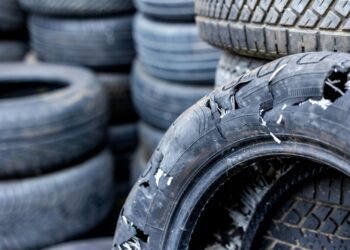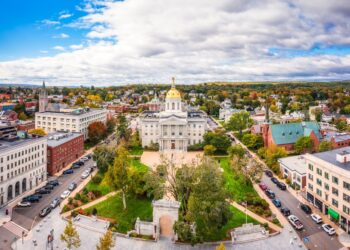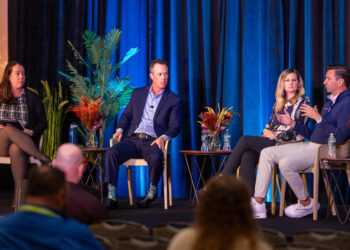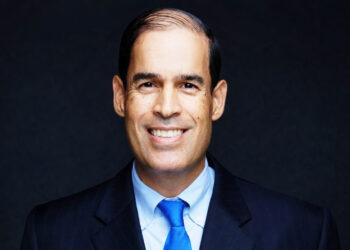 Take a look at what’s happening on North American college campuses. It’s eye-opening.
Take a look at what’s happening on North American college campuses. It’s eye-opening.
Well-run college recycling collection programs are now the norm, some with advanced processing centers, most seeing low costs and high energy from students. Schools’ diversion rates also routinely exceed those of their municipal counterparts, especially when competitive spirit and team loyalty motivate student bodies to recycle in new, bold ways.
As a person who has spent his career on campuses, I’m excited by the good work being done. It’s not only the student fervor we incite, the ethics we instill, or the tons we deliver to market – it is also the sheer purchasing power that our institutions command. It’s about new zero waste vending contracts, LEED Platinum building performance, and campus administrators finally accounting for, and valuing, climate emission reductions from sustainable materials management (SMM).
However, I’d like to focus on perhaps the most unique and least developed asset campus recycling offers: its academic potential directed at the pressing needs of our industry.
A history of campus connections
The NRC has long supported campus recycling, first hosting caucuses of campus program managers in 1992, then supporting a technical council in 1995. Recently, the NRC re-established the Campus Council to meet the need for stronger linkages between higher ed and the SMM industry. Degree programs, career services, applied research / technology transfer, and relationships with recycling leaders are examples of the opportunities the Campus Council develops between on-campus and off-campus groups.
In May 2015, the NRC hosted the first National SMM Summit at the University of Maryland, where a number of campus organizations joined with the NRC on a plan to increase collaboration between higher ed and the SMM industry. Campuses and the NRC are now progressing the ideas put forth in the plan. Each year since 1994, scholarships have been made possible under the Murray J. Fox Scholarship Fund, administered by the NRC and led by Fox himself. He is a long-time NRC member and supporter, and for over 20 years, his endowment has paid off in promising leaders, each with the aptitude and commitment to make a difference with their degrees. This year the Council will award scholarships to four exceptional students from New Orleans-area colleges and universities.
The Council also supports the NRC’s National Standards Certification Board (NSCB) for accrediting training programs (not individuals). As SMM becomes a higher priority for local governments, businesses and institutions, a well-trained pool of certified professionals becomes even more important. In July 2016, the Illinois Recycling Coalition’s Professional Certification program was accredited by the NSCB, joining states such as New Mexico, Pennsylvania and New Jersey. The Council offers training and research materials with which to build or augment courses.
The Council also identifies, connects and seeks funding for university research and development programs. The Summit participants last year were really thinking forward when calling on campuses to investigate problem materials, improve product design and develop recycling sector innovation. This is a tall order for most colleges, where faculty still teach from outdated, impractical information and squander opportunities for enabling our youth and advancing the industry.
Innovation in action
Great examples of sponsored research and campus service do exist. Take for instance, a project to develop a long-coveted, truly re-pulpable hot/cold paper cup. Georgia Tech Institute of Paper Science and Technology conducted a full study indicating yields over 78 percent by weight, captured as acceptable fiber. A California startup using this recycle-friendly barrier technology is working with Orange Coast College (California) to stock its grab-and-go operations with this entirely new product that promises to be efficiently and profitably recycled. Clearly, innovation excites today’s college minds.
What about collaboration among states and schools? While it is unfortunate more states do not fully invest in their higher ed, New York is a shining example of one state that does. The Syracuse University Environmental Finance Center is partnering with NRC’s affiliate, the New York State Association for Reduction, Reuse, and Recycling (NYSAR³). They have jointly developed a special series of tours that this month will highlight New York state’s materials recovery facilities, composting facilities, anaerobic digestion systems, reuse centers and more.
Kansas is another state that connects its “towns with its gowns.” Johnson County Community College in Overland Park offers hands-on, experiential education in solid waste management. The program reaches scores of students each semester through internships and waste audits. The school’s Center for Sustainability also applies this research to its in-vessel composter, educating area school districts and the Kansas Department of Health and Environment, which uses the system as part of composting workshops.
The Campus Council prioritizes service to state recycling organizations (SROs) that want more fruitful relationships with their campuses (as attendees and speakers at state conferences, for instance). We are also launching a set of professional development resources available to SROs, campus groups, and industry associations.
NRC’s Campus Council website and social media will connect you, the off-campus reader, to ways you can help, including hosting tours, providing guest speakers, contributing curricular materials, and sponsoring interns and research, to name just a few ways you can help your local campus, or even your alma mater.
Playing a decisive role
In summary, colleges and universities have unique, even decisive, roles and responsibilities when it comes to reducing, reusing, recycling and rethinking material use. Schools’ concentrated and valuable material streams, significant purchasing power, and the focus of this article – academic potential – position higher education institutions to contribute to SMM now and in the future.
Get to know the NRC ‘s Campus Council and take advantage of the opportunities the group offers.
























